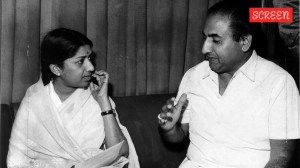Living with the Chandras
It's happened yet again. A window suddenly opens to a seemingly normal household and what we witness causes us to shudder in horror. So immu...

It8217;s happened yet again. A window suddenly opens to a seemingly normal household and what we witness causes us to shudder in horror. So immured have we become to the routine attacks on daughters-in-law/wives within the home that in the recent case involving an upper middle class Bulandhshahr family, it was not the animal ferocity with which the young woman, Jyoti Chandra, was attacked 8212; she was bitten on both cheeks and index finger 8212; that caused surprise. How, we ask ourselves, can a father/grandfather attack and grievously injure his own defenceless, four-year-old daughter/granddaughter, piercing her stomach and genitals with a broken car wiper? Our hearts go out to the little one. Hang her attackers, we cry out.
Of course, we are right to feel this great sense of outrage. This incident seems to mark a new level in domestic bestiality. But we must also not make the mistake of separating the attack on Shreya from that on Jyoti. They are of a piece 8212; indeed, the attack on the child was an extension of the attack on her mother. Together they represent the continuing devaluation of women and the endemic violence they could face at various stages of their lives.
As the National Family Health Survey-2 showed, women can be beaten for any reason 8212; from going to the market without permission or putting more salt than was necessary in the dal to the failure to bring enough dowry or to bear a son. Jyoti, it appears, was judged guilty on the last two counts, which is one more reason why the attack on her daughter assumes such significance.
Imagine, for a moment, what her life within the Chandra household would have been like in a marriage based only on the crassest of social and family expectations. A marriage in which her status is measured solely by the wealth she brings into her new home and her ability to ensure a male heir. A marriage in which there is no bond of love or mutual respect between her and her husband. A marriage where she is more 8220;daughter-in-law8221; than 8220;wife8221;, more liability than asset. Think then of the emotional isolation that she lived in, an isolation that must have got quickly laced with fear as the hostility of the other members of the family grew, as they began forming a united front against her. Think also of the moment of Shreya8217;s birth and the 8220;disappointment8221; the birth of a girl must have entailed for the family.
That window on the Chandra family has already shut. The Union health minister kindly allowed Jyoti and Shreya to stay on at the All India Institute of Medical Sciences so that they got the best of medical attention. Attempts are being made to get her a job so that she can bring up her daughter without having to go back to a violent marriage. As for punishing the beasts who committed the atrocities, the law will take its course. It is time to go back to our lives, it seems. Or is it?
Solutions to individual cases are important. The public and media outrage over the Chandra family8217;s violence have ensured a modicum of support to a beleaguered woman. But we must also remember that Jyoti8217;s experiences are, and could be, those of countless others. The NFHS-2 document puts it down in the detached tones of such texts: 8220;These results underscore the widespread prevalence of domestic violence in India8230; The high level of acceptance of wife-beating also suggests that women may feel powerless against such violence and will tend to accept it without question.8221; Women within such marriages, given their isolation, have no choice but to do this. But what about society? Why have we come to accept domestic violence 8212; possibly the most widespread crime in the country today 8212; without question? Is it because of the 8220;sacredness8221; of marriage as an institution? The mindset which maintains that the family can do no wrong? The ostensible respect we have for people8217;s privacy? Or is it because such behaviour has become normalised?
A government that displays the greatest alacrity in passing legislation it considers vital in the nation8217;s interest, has given domestic violence 8212; an issue that is clearly of the greatest national interest because it concerns the basic unit of the nation, the family 8212; short shrift. The flawed Protection from Domestic Violence Bill that it had come up with was rightly sent to a select committee for scrutiny and correction. That was over a year ago. Nothing has been heard of it since. Recently, 40 women8217;s groups have urged the prime minister to resurrect it, but with the government8217;s attention now firmly fixed on elections, it is unlikely that there will be any action on this for a while.
One law may not make a great difference but it represents a social consensus against violence rendered acceptable because it takes place within the sanctity of marriage. We also need to hang on to our outrage over the treatment meted out to Jyoti and little Shreya and turn it into a searing indictment of hierarchies, practices and mindsets that allowed it to happen in the first place.
- 01
- 02
- 03
- 04
- 05































